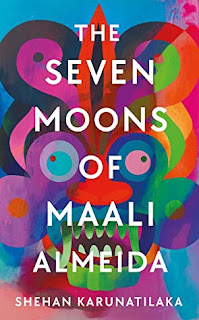9781908745903
Sort of Books, 2022
385 pp
hardcover
Not too far into the first chapter I realized that this book and I were going to get along just fine, and I was right. To put it bluntly, I effing loved this book and have been telling everyone about it.
The author sets his story in 1990, and as it opens, the main character Maali Almeida wakes up (as he believes) "hungover" to find himself in an "endless waiting room" not knowing how he got there. He is sure that he's hallucinating, having a "trippy dream" from the "silly pills" given to him by his friend Jaki, but he's actually awoken in the afterlife where he is standing in a queue. Evidently it is as completely disorganized as any typical earthly bureaucracy, with plenty of people complaining and the office "short-staffed and looking for volunteers." The woman who seems to be checking him in hands him a dried printed palm leaf, telling him that he needs to get his ears checked, his "deaths counted," his "sins coded" and his "moons registered," and that he (along with everyone else coming in that day) has "seven moons." Here seven moons equates to seven days, rather than the typically-understood idea of moons as months; Almeida is also handed a checklist of things to be taken care of before he can enter "The Light," which is, as the woman notes, "Whatever You Need It To Be." That is the short answer; later he will learn that all who come here to "wander the In Between" have his or her allotted moons "To recall past lives. And then, to forget." For some remaining in the In Between, however, "forgetting cures nothing," believing that "Wrongs must be remembered."
Very briefly, largely because I'm so behind here, in 1990, Sri Lankans were in the thick of that country's civil war which had begun in 1983 and didn't end until 2009. It was a violent, horrific time, with death squads everywhere and scores of people being murdered or disappeared, many never to surface again. Maali Almeida is a photographer who had a complicated life, as noted at the beginning when he talks about what his business card might have said about him: "Maali Almeida: Photographer. Gambler. Slut." He had lost lots of money at the casinos, was (as quoted in the dustjacket blurb) a sort of outcast "closet gay" in love with his friend DD (although he sleeps around on his many travels) and more importantly, he had been witness to the terror and the carnage through his work as a fixer for various groups including politicians, army officers, NGOs, the press, and other dubious clients. He figured that by working on all sides, he would be seen as favoring none of them, a strategy that in hindsight, obviously didn't work out well for him. He had also taken a number of photographs that as he had once told his friends, could "topple the government," now sitting in envelopes in a box under his bed. These photos are incriminating to the point that if seen, "this country will burn again," but he had hoped that by making them public they might bring some sort of accountability and judgment, especially against those who participated in the 1983 massacres and other atrocities, or quite possibly even end the conflict. Part of what Maali needs to accomplish during his seven-moon span is to somehow have his closest friends DD and Jaki take out and exhibit these photos publicly, but there are certain constraints in place that make it difficult for him to make contact directly with the living, so he has to learn to rely on the dead (and in one case, a creepy medium linking both worlds) to help him in his task. But that's not all -- he also wants to solve the mystery of his own death. As time starts to tick down, another mission is added to this lineup -- he will somehow need to protect his friends who, in the aftermath of Maali's photos, get caught up in a chain of events putting their lives in jeopardy.
This is a book I just could not stop reading, and the way the author structured his story I thought was absolute genius. It is a mix of historical fiction, humor and political satire in which the author not only exposes the horrors of these dark years, but also through the many ghosts with whom Maali Almeida speaks, imagines what those who died during this conflict might say if only they had a voice, making me wish that the book's original title, Chats With the Dead would have been retained. It is also part ghost story and part whodunit, for me an unbeatable combination. As seen in both the afterlife and in earthly life, the novel also speaks to those in positions of power who put their own self interests ahead of everything else, making it a timely read for sure. It's one of the most original books I've had the pleasure to have read in a long while, and most certainly a book I can recommend.



